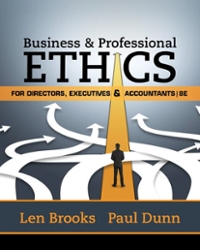Sophia and Maya were having a quiet afterwork drink at the Purple Pheasant around the corner from
Question:
Sophia and Maya were having a quiet afterwork drink at the Purple Pheasant around the corner from their office. Both are professional accountants in their late twenties and were talking about their futures in public accounting.
“I want to concentrate on the notfor-
profit sector,” said Sophia putting her glass of Chardonnay down on the table.
“I really enjoyed the two months I spent at Save-a-Tree Foundation. And there’s a huge demand for providing consulting advice to environmental groups and agencies.”
“There’s no money in that,” said Maya.
“They can’t afford to pay you the big bucks.
Not me. I like tax. That’s where the money is; providing advice to wealthy clients who can easily afford to pay.” She sat back in the booth sipping her Manhattan. “Do you know what my current billing rate is? It’s outrageous, is what it is! But I’ve got a 94%
recovery so I’m looking at being made a partner next year.”
“It’s not about money, it’s about helping people. We’re supposed to be upholding the public interest, not the interests of some fat cat executives.” Sophia was leaning forward to make her point.
“Hey. I don’t make the rules. I just follow them. The Income Tax Act is a rule book.
I would never advise a client to break the law. But there’s lots that’s not covered.
When the law doesn’t prohibit something or when it’s ambiguous, that’s when we can advise them and come up with a plan. We always tell them there’s a risk that the deduction might be disallowed. We cover our ass, and leave the ultimate decision up to them.”
“But they’re following your advice because you’re the expert. They’d never come up with these schemes on their own.
You’re the one who found the loophole.”
“We don’t look for loopholes. We plan and offer sound advice that fits with the client’s business objectives. Loopholes are outside the law.”
“Whatever! You’re the one who came up with the plan and how to implement it.
You’re telling them that it’ll save them some money. They’re not going to say no to that. They’re like children, doing whatever mommy says.”
“Yeah.” Maya shrugged and smiled.
“Occasionally they do ask for a second or third opinion.”.........
Questions:-
1. Is there a basic conflict of interest between upholding the public interest and providing tax advice that reduces the amount of money taxpayers pay to the government? Why or why not?
2. How can professional accountants maintain the support of the public while giving tax advice? Is providing tax advice that only benefits the wealthy, who can afford to pay for tax advice, in the public interest? Is this fair? Is providing highly specialized tax advice to naive clients being paternalistic?
3. If a tax specialist spends only one hour devising a tax plan that saves a client \($1\) million, is it ethically acceptable for the tax specialist to charge that client more than the one-hour billing rate?
4. Is it ethically correct for a corporation to pay \($350,000\) to tax consultants so that the corporation can save a million in taxes?
Step by Step Answer:

Business And Professional Ethics
ISBN: 9781337514460
8th Edition
Authors: Leonard J Brooks, Paul Dunn





